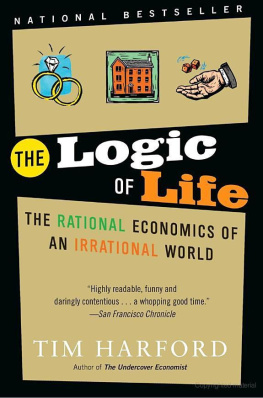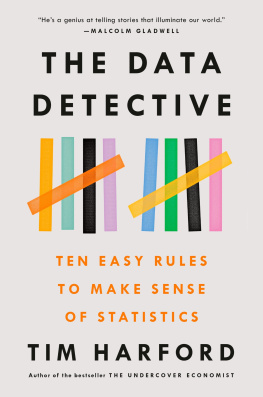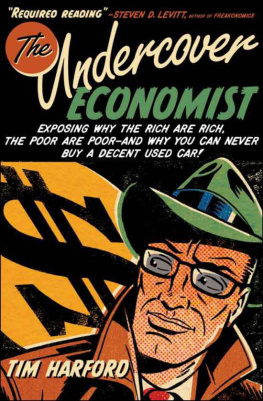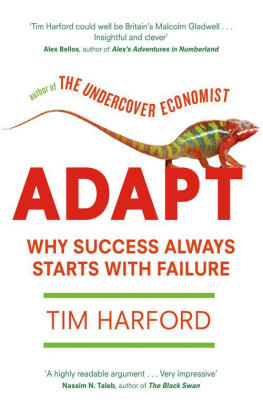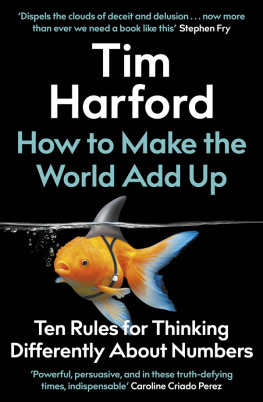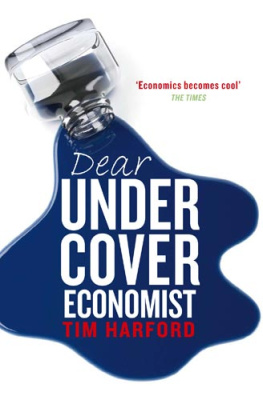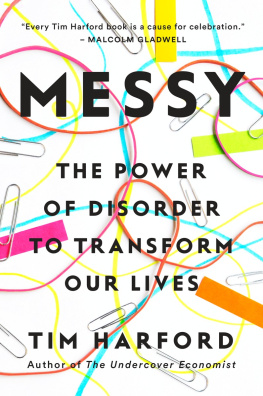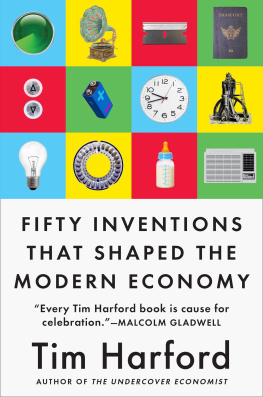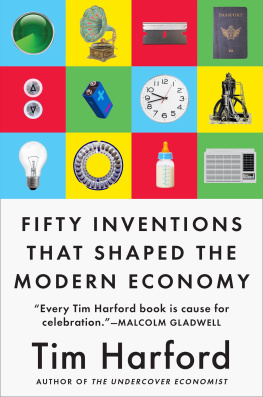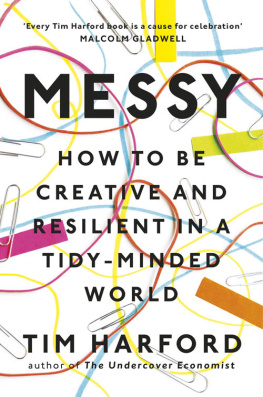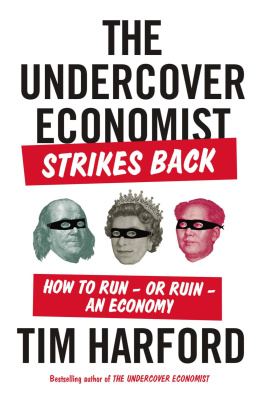
CONTENTS
TO ADRIAN
AND
AFRICA, WHO WILL GET HER TURN IN THE STROLLER
INTRODUCTION
This morning, I strapped my two-year-old daughter into her stroller and walked her to the toddlers art club at our local community center. Our neighborhood is rough around the edges. A town planner might raise an eyebrow at the mechanics yard, piled high with wrecks, at the end of a row of terraced houses. A sociologist might draw your attention to the betting shops and massage parlors, or the pool of dried-up vomit in the gutter outside our local bar. A novelist might linger descriptively on the bunch of dead flowers, bleached and desiccated in the bright June sunshine; they were propped forlornly against the wall of a notorious nightclub, commemorating a young man who was recently shot dead.
But I am an economist. You might think that my mind would be elsewhere, thinking about stock markets or inflation figures, but if so, youd be mistaken. I notice the gamblers and the call girls, the drinkers and the gangs. I just see them in a different light. Economists are always looking for the hidden logic behind life, the way it is shaped by countless unseen rational decisions. Sometimes these rational decisions make life better, sometimes they make it worse. But if we want to understand our worldor how to change itthen understanding the rational choices that shape it is a good place to start.
To get to our destination, my daughter and I have to cross a busy road. This is a lot harder than it should be, because the traffic lights that smoothly guide the traffic through the T intersection give neither sufficient time nor any signals to pedestrians. I scurried across to the central island, spun my daughters stroller around so that I was pulling it behind me, walked in front of a stationary bus, and peered out across a second lane, looking for a chance to scamper to the other side.
The dangerous crossing is the result of a political failure. In a wealthier neighborhood just a mile away, there are three freshly painted pedestrian crossings on the main street, even though that street was never difficult to cross. Both neighborhoods are covered by the same local government. What can account for the disparity? If I wasnt looking for the rational incentives under the surface, I might simply grumble about the way that rich white areas find it easy to pull strings and make friends in government. Or, if my political biases were different, I could grumble that the poor residents are just incompetent and stupid.
But both of those viewslike much of todays conventional wisdomare shallow. The economists way of thinking suggests a deeper answer. The typical resident of the rich neighborhood owns his or her own house, plans to live there for years, and so has a lot to gain from improvements in the neighborhood. The political influence of the rich neighborhood is stronger only because the individuals there have a stronger incentive to be politically active. In my neck of the woods, by contrast, residents tend to come and go; time spent fighting for a pedestrian crossing would be, for many, time wasted on producing an amenity that would benefit neither absentee landlords nor their transient tenants.
That is just the hint of an answer, idly formed while pushing my daughter past the local corner shops and nail salons. Even that hint is more help to a reformer than simply railing against the injustices of life. But to be convinced, I hope youd want to see a little less speculation and a little more evidence.
A new breed of economists is gathering just that kind of evidence, peeling away layers of confusing complexity and revealing the surprising truth. How much do my neighbors and I really care about living with dangerous road crossings, nightclub shootings, and rowdy bars? For an answer, dont ask the neighbors, who would (rationally) exaggerate. Ask a real estate agent. Economists have applied this deceptively simple principle with startling results. By comparing public data on sex offenders with a map of house prices, for example, they can see that when a pedophile moves in, the price of nearby houses dropsbut only by about 4 percent.
Home prices are a tool the economist can use to uncover the truth, like the hero of a spy movie spraying an aerosol that reveals a hidden web of security lasers. The movie character uses the aerosol, but what really matters to him are the lasers. In the same way, the economist uses information about prices, but what he really cares about are the choices we make and the values we hold. Those values are often concealed: Would you really admit to the authorities that your outrage about a pedophile moving in around the corner would be assuaged by a slightly cheaper mortgage?
The fact that some people will, indeed, make that kind of trade-offin this case, perhaps, students or childless couplesis fundamental to the idea of rationality I explore in this book. Such trade-offs are not often discussed, especially in polite company. They may even be made unconsciously. Yet as long as they are made, the rational choice framework helps us understand the world.
The argument of this book is: first, that rational behavior is much more widespread than you would expect and crops up in the most unexpected placesincluding the heads of oversexed teenagers; and second, that the economists faith in rationality (faith is, I think, the right word) produces real insight. In fact, I believe that if you do not understand the rational choices that underlie much of our behavior, you cannot understand the world in which we live.
Drug addicts and teenage muggers can be rational. Suburban sprawl and inner-city decay are certainly rational. Those endless meetings at the office and the grotesque injustices of working life? Rational. In the hands of economists, rational choice theory produces an X-ray image of human life. Like the X-ray, rational choice theory does not show everything. Nor is the picture necessarily very pretty. But it shows you something important, and something that you could not see before.
At our destination, my daughter wriggled out of her stroller and scampered off to daub her hands in bright blue poster paint. I sat in the corner, thinking about the rational reasons why only two of the thirty-one accompanying parents were fathers; well get to those reasons in chapter 3. My daughter interrupted my musings by demanding a snack, so we shared a cookie and then I held her hand as she climbed up the stairs and slid down the slide several times. I helped her bounce on the trampoline and then we stuck glow-in-the-dark pictures of rocket ships and astronauts onto a paper plate before covering them with blue glitter. After a while she turned her face up to mine and stuck out her tiny nose for an Eskimo kiss. It was a perfect half hour.
There is nothing irrational about love; indeed, without our passions and our principles, where would the motivation come from to make rational choices about anything? So a world explained by economics is not a world lacking love, hate, or any other emotion. Yet it is a world in which people can generally be expected to make rational decisions, and where those rational decisions suggest some astonishing explanations for many of lifes mysteries. It is this world that I would like to show to you.
CHAPTER ONE
INTRODUCING THE LOGIC OF LIFE
The Economics of Sex, Crime, and Minnie Mouse
HARPO STUDIOS, CHICAGO
P arents, brace yourselves. With those words, Oprah Winfrey introduced America to the shocking news of the teenage oral sex craze. In The Atlantic, Caitlin Flanagan wrote, The moms in my set are convincedtheyre certain; they know for a fact that all over the city, in the very best schools, in the nicest families, in the leafiest neighborhoods, twelve-and thirteen-year-old girls are performing oral sex on as many boys as they can. Flanagan poked a bit of fun, but she wasnt really laughing: She was convinced that the fears were largely justified. Indeed, the American blow job epidemic has now been addressed everywhere from PBS documentaries to the editorial page of The New York Times, sometimes with giddy and slightly voyeuristic horror, sometimes with calm reassurance that the epidemic is simply a myth.
Next page
